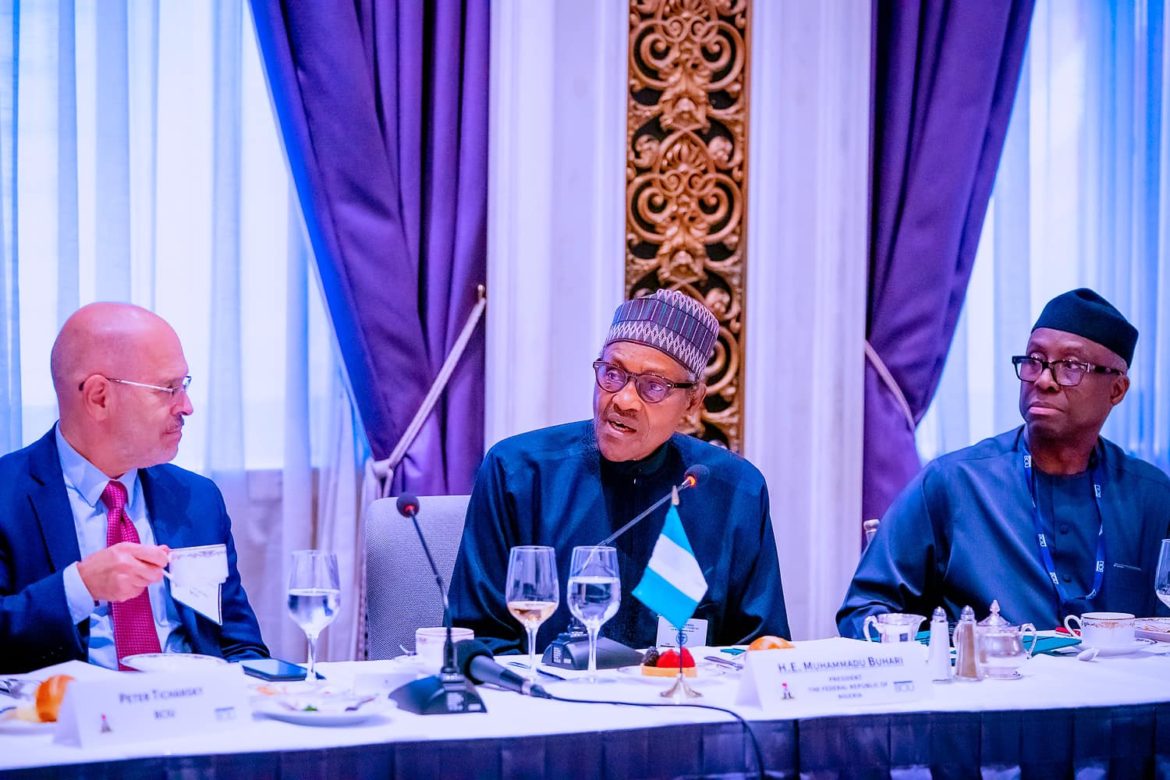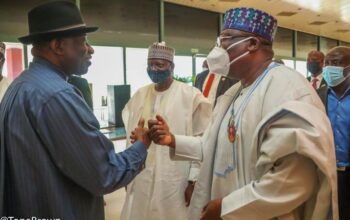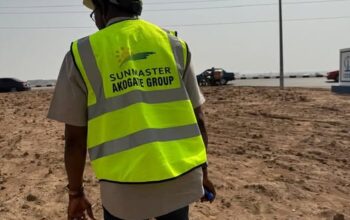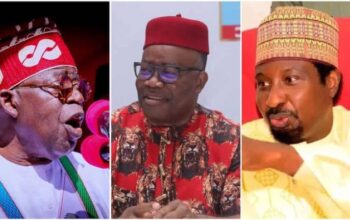EMAILEDITORS:
CALL EDITORS:
08036977194
08038565006
PRESIDENT BUHARI SEEKS INCREASE IN VOLUME OF TRADE AS NIGERIA RECORDS OVER $1.69BN EXPORTS TO U.S IN 2020
President Muhammadu Buhari has described the United States as Nigeria’s main trading partner and one of ‘‘our most important diplomatic partners,’’ underscoring the need for concerted efforts to increase the volume of bilateral trade.
The President spoke at a meeting with the Business Counc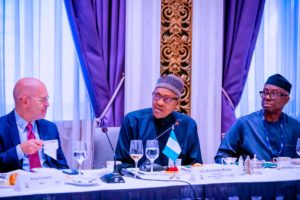 il for International Understanding (BCIU) at the Nigeria International Economic Partnership Forum, held on the margins of the 77th UN General Assembly in New York, Thursday.
il for International Understanding (BCIU) at the Nigeria International Economic Partnership Forum, held on the margins of the 77th UN General Assembly in New York, Thursday.
He told the gathering that in 2020, Nigeria exported over $1.69 billion worth of goods to the US, adding that these exports were primarily made up of crude oil and other petroleum products.
”Nigeria’s capability is not just limited to the oil and gas industry, but variety of other sectors that hold notable potentials.
”We are the largest economy in Africa and have over 200 million-strong consumer market that is home to a range of attractive opportunities in sectors such as agriculture, healthcare, light manufacturing, infrastructure development and technology.
”The beauty of this forum is that the Ministers responsible for all of these sectors are here today, as are some of Nigeria’s premier business leaders who are already excelling in these spaces, ” he said.
The President further said that Nigeria is open to deepening collaboration with BCIU, pledging this Administration’s continued commitment to maintain an enabling business environment that is friendly to foreign investors.
”Going into partnerships with trusted local and foreign partners who have well-established networks and understand the dynamics of the country is one way to guarantee success in Nigeria.
”Today’s event provides a platform for businesses under the BCIU umbrella to make connections with credible Nigerian partners. I trust that this event will help build partnerships that will translate into increased trade and investment flows between Nigeria and the United States,” he said.
Apprising the business executives on the current Administration’s economic policy, the President said since 2015, the focus has been on economic diversification and successfully, the economy is on a path of sustainable and inclusive growth through an open, rules-based and market-oriented way of doing business.
The President emphasised that his major objectives for the forum is to garner support from the BCIU for two of Nigeria’s most high-impact developmental ambitions:
”Driving strategic and financial investment into Nigeria’s real-sector transformation, and rightly positioning Nigeria as a major international supply-chain partner to leading global economies like the United States.”
According to the President, global supply chains are currently facing a challenging time as U.S. shippers have been under strain caused by reduced inputs from China and the growing backlog of European imports caused by the Russia-Ukraine crisis.
He added that the world has not fully recovered from the economic challenges caused by the COVID-19 pandemic and this has taught everyone the importance of having viable alternatives when traditional supply chains are unable to serve our needs.
”The current global challenges are expected to continue into 2023 and beyond, but Nigeria is ready to fill a greater amount of global demand.
”We are leveraging on our skilled labour-force, strategic location, as well as production and manufacturing potential to move forward as a key trading partner to the United States.
”I have always held the strong conviction that there is no crisis without an accompanying opportunity and solution. Increased collaboration with Nigeria and other developing markets is needed to mitigate against both current and potential future supply-chain challenges.”
Expressing confidence that the situation in the world today presented an opportunity for real sector investment in Nigeria, the President noted that since signing the African Continental Free Trade Agreement, Nigeria has strengthened its position as a gateway to an integrated continental market, consisting of 1.3 billion consumers with an aggregate GDP of $3.4 trillion.
Further, he stated that the administration had focused strongly on developing Nigeria’s manufacturing sector, and given the country’s enormous natural resources, technological partnership is needed to transform this natural endowment into high value goods.
”To drive forward our manufacturing and production capacity, we have developed 17 operational Special Economic Zones with four more currently under construction.
”Fourteen of these are general economic zones which support export processing, large-scale manufacturing, warehousing, logistic services, tourism, food processing and packaging as well as technology development; the remaining three are dedicated to oil & gas related activities.
”We have furthermore commenced the development of three automotive Industrial Parks that encourage the local assembly of vehicles for the Pan-African market.”
President Buhari also used the occasion to list fiscal investment incentives formulated to encourage increased private capital inflows into Nigeria.
They include: ”Three to five years of tax holidays for enterprises in what we deem pioneer industries; tax-free operations and no restrictions on expatriate quotas in our Free Trade Zones; capital allowances for agriculture, manufacturing and engineering; and a VAT regime of 5 percent; among others.”
The President of the Republic of The Gambia, Adama Barrow was a Special Guest at the event.
Femi Adesina
Special Adviser to the President
(Media & Publicity)
September 22, 2022
IN NEW YORK, PRESIDENT BUHARI SAYS INVESTMENT IN SECURITY YIELDING GOOD DIVIDENDS, WOOS MORE INVESTORS TO NIGERIA
President Muhammadu Buhari on Thursday expressed delight that investments in improving security are yielding good dividends, lauding the Nigeria military for making significant progress in the fight against insecurity and building the momentum in reducing challenges to its barest minimum.
Speaking at the Nigeria International Economic Partnership Forum held on the margins of the 77th UN General Assembly in New York, the President pledged that the Federal Government would do more to improve security, recognising that the sector is another critical element in the flow of investment, and overall economic and infrastructural development.
”We will continue to give all necessary support to our security outfits to ensure that they are able to tackle the challenge headlong”, he said, stressing that ”the advantages and disadvantages of investing in Nigeria far outweigh the challenges.”
President Buhari also declared that in spite of the global crisis fuelled by the Ukraine-Russian war, the lingering COVID-19 pandemic and insurgency in some parts of the country, Nigeria is on course to taking her rightful place in the global economy.
He attributed the country’s success story to the implementation of reforms aimed at attracting foreign investments and sustained improvement in governance.
He noted that the quarterly GDP growth in Q1 2022 has been mostly driven by the non-oil sector, giving credence to the revenue source diversification agenda of government.
The President, however, acknowledged that more still needs to be done to improve private capital flows into Nigeria through Foreign Direct Investment and financing for infrastructure, affirming that the administration is leveraging the Integrated National Financing Strategy to address this.
On growth driven by the non-oil sector, the President said:
”The agricultural sector, our most important, has remained resilient in spite of security concerns, low irrigation, limited inputs, and legacy infrastructure challenges, with strong food demand bolstering growth. Growth in manufacturing reflected stronger household and business consumption on account of the reopening of economic activities and improvement in supply chains.
”The present growth in our service sector is promising. Further privatization, foreign investment, globalization and competition will serve to stimulate growth and competition in the service sector and the economy as a whole.
”On the domestic front, the Federal Government is taking some bold, decisive and urgent action to address revenue underperformance, and improve our operations to make investment in Nigeria very attractive.
”Overall, the Nigerian economy is ripe for increased investment. But on the contrary, private capital flows into Nigeria, consisting mainly of Foreign Direct Investment, have slowed, hindering the financing of much-needed infrastructure and natural resource access projects. Our Administration is already working on innovative ways to restore these flows.
The President who was represented at the opening session by the Chief of Staff, Prof. Ibrahim Gambari, told the international economic forum attended by Akinwumi Adesina, President of African Development Bank, and Florie Liser of the Corporate Council on Africa, among others that a key strategy being adopted to improve infrastructure financing is the Integrated National Financing Strategy.
He explained that the strategy seeks to identify ways to expand the financing envelope of the Sustainable Development Goals in Nigeria, enhance the sustainable development impact of financing by seeking to integrate and align public and private financial policies, regulatory frameworks, instruments, and business processes with sustainable development.
He added that the private sector would play a significant role in the strategy.
The President also mentioned other efforts by his administration to improve the nation’s economic and development outlook, such as Nigeria’s National Development Plan (2021 – 2025) and the Presidential Power Initiative.
On Nigeria’s National Development Plan, the President stated that it was formulated against the backdrop of several subsisting development challenges in the country and the need to tackle them within the framework of medium and long-term plans.
”This all-encompassing plan, aims to generate 21 million full-time jobs and lift 35 million people out of poverty by 2025, thus setting the stage for achieving the government’s commitment of lifting 100 million Nigerians out of poverty in 10 years.
”To attain the objectives of the National Development Plan (2021 – 2025), we estimate that we would require an investment commitment of about N348 trillion. Government capital expenditure during the period will be N49.7 trillion (14.3 percent) while the balance of N298.3 trillion (85.7 percent) is expected from the Private Sector.
”Of the 14.3 percent government contribution, FGN capital expenditure will be N29.6 trillion (8.5 percent) while the Sub-National Governments’ capital expenditure is estimated to be about N20.1 trillion (5.8 percent).
”The successful implementation of this Plan will, therefore, be heavily dependent on strong partnerships between the private and public sector, both within and with Development Partners outside Nigeria.”
Regarding the power sector, President Buhari noted that his administration has recognized it as a major catalyst for Nigeria’s industrialization, adding that in July, 2021, the 614-kilometre Ajaokuta-Kaduna-Kano gas pipeline project was launched to enhance energy security.
”Our Administration also provided the sovereign guarantee for this vital infrastructure project. When completed, this project will drive industrialization across the country.
”Furthermore, the first phase of the Presidential Power Initiative will provide over 40 million people with more reliable electricity supply, create 11,000 direct and indirect jobs for Nigerians.
”This will be from power system engineers to electricians and contractors, and this will in turn improve the standard of living while providing homes and businesses with constant, reliable, and affordable electricity supply. ”
The President recalled that at the commencement of his Administration, N200 billion was paid for stranded power to service existing liabilities:
”Contract terms in Power Purchase Agreements were changed from ‘Take or Pay’ to ‘Take and Pay.’ Similarly, the Distribution Companies were made to use banks for bill collections – prior to this, Transmission Company of Nigeria (TCN) was getting only 50% of proceeds. Now, TCN is financially viable and can invest in its own infrastructure.”
Wishing the forum very successful deliberations, President Buhari assured them that the Federal Government of Nigeria is very keen to consider the outcome of the deliberations and recommendations to elevate the Nigeria project to its rightful place of magnitude.
Femi Adesina
Special Adviser to the President
(Media & Publicity)
September 22, 2022
PRESS RELEASE
LASG ASSURES TIMELY COMPLETION OF LEKKI-EPE EXPRESSWAY
The Lagos State Government has reassured residents of the timely completion of the Lekki-Epe Expressway with advice to motorists to obey the traffic signs at the construction site.
Special Adviser on Works and Infrastructure, Engr. (Mrs.) Aramide Adeyoye made the statement on Thursday after visiting the Awoyaya Axis of the Epe Expressway together with several stakeholders like Craneburg Construction, Lekki Estate Resident Association (LERSA) and others, in response to the complainant about the ongoing construction work on the expressway (from Eleko to Abraham Adesanya).
Speaking during the inspection, Adeyoye said attitudinal change on the part of motorists and commuters will help a great deal in bringing sanity to the road as construction intensifies on the Lekki-Epe Expressway.
Adeyoye said the Lagos State government is aware of commuters and residents’ pains but is set to replicate the feat from 18 kilometres of Phase I of the Lekki -Epe Expressway, from Eleko Junction to Epe, which is 95 percent completed, by delivering one kilometre per month on the 16 kilometres, Phase II of the project, which is from Eleko Junction to Abraham Adesanya.
“We want to reassure our citizens that the government of Lagos State is assiduously working at improving their lives. Governor Babajide Sanwo-Olu has done a lot in the delivery of dividends of democracy to the people of Lagos State and our works are visible in all parts of the state. Phase I of the Lekki-Epe Expressway, which is from Eleko Junction to Epe, is almost 95 percent completed. We will soon start full work on Phase II of the project, which is from Eleko Junction to Abraham Adesanya,” she said.
The Chairman of Ibeju Lekki Local Council Development Area, Hon. Sesan Olowa, who commended the developmental strides of Governor Babajide Sanwo-Olu’s administration, said the Council is doing everything possible to support the state government in ameliorating the hardship being faced as residents commute on the corridor.
“We are very happy and the people of Ibeju Lekki will also support every effort in this direction. We are going to work closely with the contractor and the Ministry of Works and Infrastructure to ensure that we manage whatever challenges that might occur during the construction,” he said.
Also speaking, the Chairman Infrastructure Committee of the Lekki Estates Residents and Stakeholders Association (LERSA), Suleiman Bello pledged continued collaboration with the state government to ensure coordinated traffic management on the Lekki/Epe Expressway Corridor as the project progresses.
Bello, who said they are always on the ground to monitor and give feedback to both residents and government, appealed to commuters to be patient on that axis and follow the laid down rules for the work to move smoothly.
“Our role is to ensure that we get the best value. The money they are spending on this project belongs to you and me. So, we must get the best value for all our residents and stakeholders. We must tell our residents and stakeholders to calm down when they are on this construction stretch because if we all behave ourselves when we get to this area, the road project will go very easily and seamlessly. We also have a responsibility to protect the people who are working on the construction site,” he said.
The Project Manager, Craneburg Construction said the Eleko to Epe Road construction is already done even before schedule and this current construction of Eleko back to Abraham Adesanya has started too.
He appealed to motorists for patience and to follow the traffic rules and diversions.
The reconstruction of the Lekki-Epe Expressway (Eleko to Epe T-Junction) which was started by the administration of Governor Babajide Sanwo-Olu is almost done and the 2nd Phase of the Project which is ‘Eleko Junction back to Abraham Adesanya’ has started and will be delivered too.
